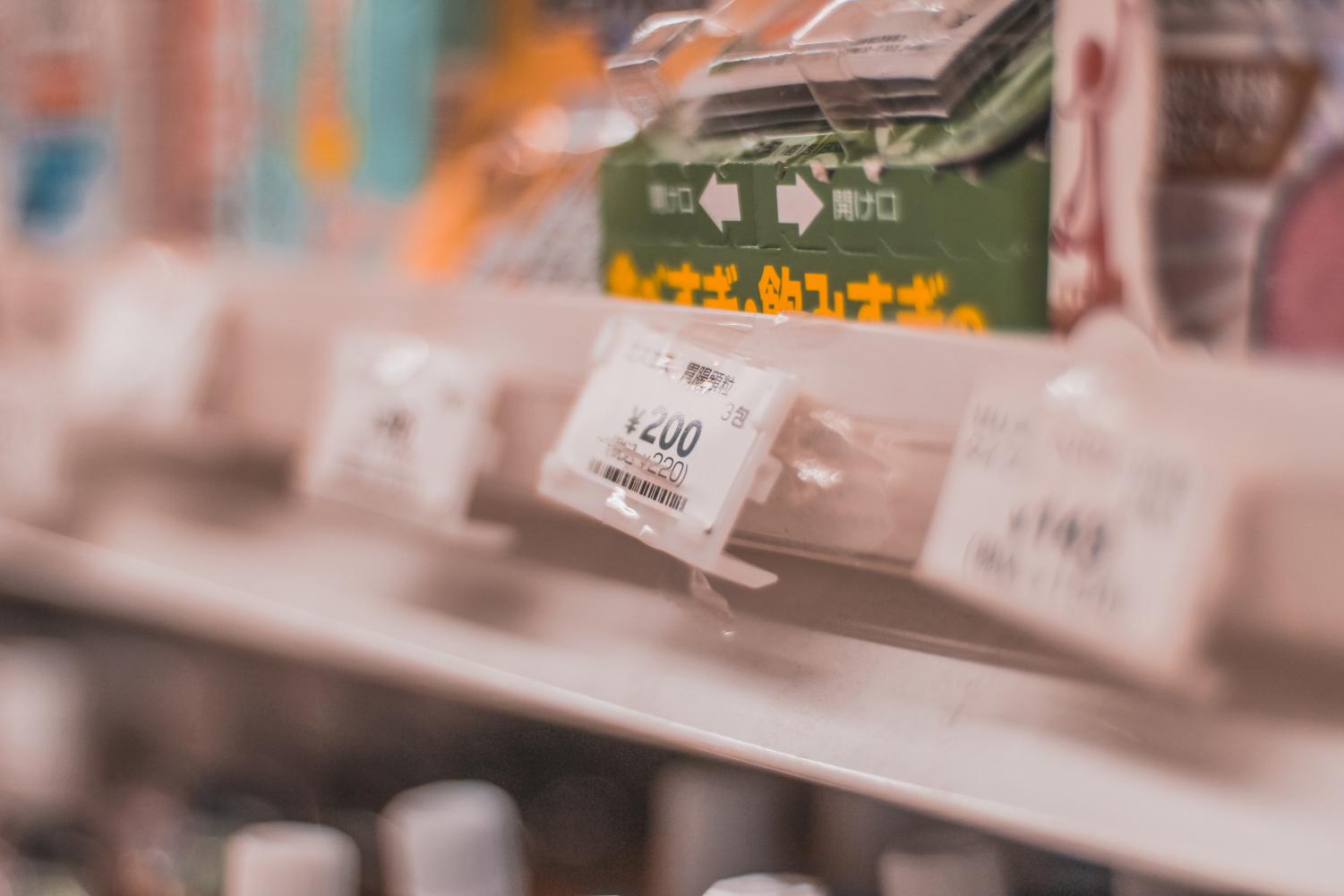Japan’s Consumption Tax Climbs
Photo by Marina Ten Have
December 4, 2019
Store owners in Japan were tasked with more than just turning a page of their calendars when October 1 arrived: the new month marked an increase in the consumption tax rate from 8% to 10%. Many store owners throughout the country stayed until late at night to update registers and change signs.
The Japanese government increased the consumption tax rate to deal with the growing costs of social welfare, a rise exacerbated by the aging of the population. According to Nikkei, the Japanese government will have a revenue increase of approximately 4.6 trillion yen per year, which can be directed towards social welfare.
One item excluded from the new rate is food taken out of the store. Because of this, people have been taking food out more often to avoid paying the extra rate. Senior Remi Khan says that “I have definitely been wary about the price differences.” She also notes that because the rates are lower for take-out, Japan may be headed towards “more exclusive and introverted communit[ies].”
The consumption tax rate was first introduced in 1989 and was set at 3%. Since then, the rate has increased to 5%, then 8%, and finally to 10%. The most recent increase had already been proposed twice, but canceled because of its potential economic effects: past increases in the rate resulted in the economy suffering from a recession.

However, a Reuters poll reports that 70% of companies have found that the effects of this tax increase have been milder than the previous one. Further, the government introduced a program that returns 5% on purchases made using cashless payments at smaller businesses. The program will run until the Olympics next year and is designed to also combat the effects of the tax increase.
One effect of the new rates, smaller than the previous increases but still significant, was the rise in purchases prior to October 1. In order to beat the increase, many people rushed to buy things ranging from train passes to electronics. Overall, according to Mainichi, the average household expenditures increased by 9.5 percent in September, to a level that is the highest since data was made available.
Senior Hannah Nemeth comments that though she “would most likely not support” another increase in the tax rate, for now, “the increase in tax rate has not affected what I buy.” Though impossible to predict completely accurately, Japan’s fairly strong economy makes it likely that the country will soon recover from the negative impacts of the consumption tax increase.






















Koei • Dec 13, 2019 at 2:14 PM
This article was really informing and interesting!
Increasing taxes may sound bad because as it says, the average increase for a household increased by 9.5%, which sounds really awful; Change in taxes would lead to more social welfare, namely, 4.6 trillion yen per year, and the introduction to a program that returns 5% on purchase can alleviate the rise of taxes.
Overall, I found this article a very informative article about something that is affecting everyone in Japan.
Alyson Lee • Dec 13, 2019 at 2:12 PM
Wow! Thanks for the informative article! I can’t believe that the taxes have gone up, meaning that I would have to pay more and be careful of what I buy, wherever I go!
Hannah D • Dec 13, 2019 at 2:10 PM
This article was very informative to me since I knew that there was a tax raise but I didn’t know why. It also told me how much the tax has changed since it started and about the economy of Japan.
Kano • Dec 13, 2019 at 12:26 PM
It was interesting to learn about the consumption tax rates’ surprising facts. Now I know the huge rate changes in only 30 years. It was surprising how the first tax rate was set at 3%.
Leon Miller • Dec 13, 2019 at 12:24 PM
While I personally won’t be seeing any of the benefits of the tax increase, I think that it’s the necessary move to keep the Japanese economy running. Still, with what seems to be a non changing trend of a dwindling younger population, its pretty worrying to think what might end up happening to the Japanese economy if we don’t get an increased workforce.
Jaden • Dec 13, 2019 at 12:23 PM
I think the tax really doesn’t change how most people spend their money in the end. However, it’s good for the economy and the general society as the tax money is still going towards helping the country.
Max • Dec 13, 2019 at 12:22 PM
This was truly an informative article on the new tax rates, and that the tax rate doesn’t affect foods taken out of stores. I hadn’t realized this yet and I’ve always been wondering why the workers at the convenience stores have been asking me if I am taking the food out or not, and this makes a lot more sense now. From now on I am going to keep this in mind.
Kota • Dec 13, 2019 at 9:04 AM
It was really interesting to learn about the tax rates in the past. I didn’t know that they were only introduced 30 years ago. Next time I go to buy something, I will keep this article in mind.
Tommy Knopp • Dec 13, 2019 at 8:36 AM
Even though the tax change is annoying for the consumers that buy the products, in the long run, I think it will be beneficial to Japan’s economy as a whole as the shrinking population means a smaller working population. Since there will be a smaller working population, the taxes gathered from people’s income will be lower, and the increased sales tax is to combat that. Because of the higher sales tax, Japan can become a better place by spending tax money on public services.
Oliver Raffone • Dec 13, 2019 at 8:34 AM
Wow, thank you so much for the very informative article about Japan’s Consumption Tax Climbs! I really enjoyed it and now I know about how Japan raised consumption taxes from 8% to 10%.
Chris Cole • Dec 12, 2019 at 12:22 PM
the additional tax prices can be very annoying, and even though the tax percentage may seem very low and like it might not make a difference it can actually make all the difference. I remember this one time when I had decided to get something from lawson with the change in my pocket, and I decided to get some ice cream until I went to the register and was told I needed four more yen. Just a small difference in price can differ from ice cream to no ice cream.
Elena Noda • Dec 12, 2019 at 12:19 PM
It was really interesting to learn that tax rates have been increasing over the years from 3% to now 10% and I think its was really interesting to know that the household expenditures increased in September, and had the highest data, right before the tax increased.
Koharu • Dec 12, 2019 at 12:19 PM
I didn’t know tax rates were introduced only 30 years ago! Surprising how it has risen so much in such a short amount of time.
Annmarie Hashimoto • Dec 12, 2019 at 12:18 PM
Wow I didn’t know that the consumption tax rate was something introduced fairly recently. Yet in the past decade I’ve seen it double, I hope it doesn’t increase even more! But if it does help the economy I guess I’d be in support of it.
Risa Kunitake • Dec 12, 2019 at 10:07 AM
Thank you for writing such an informative article!
Personally, I think that raising the tax to 10% is a little too much since they won’t benefit me or my family that much, but with Japan’s aging population, it might be beneficial for the country. My mom said that she wants to buy as many products from outside countries where the tax rate isn’t as high (Taiwan, Thailand, etc.) because of the increase in the consumption tax rate.
Annika Elstrom • Dec 12, 2019 at 10:03 AM
I thought this article was incredibly interesting and I enjoyed reading about the affects the tax increase will have on the population in the future.
Alex Volkov • Dec 12, 2019 at 10:00 AM
I believe that this increase in tax will be good for Japan. I know that prices will be higher, but the increased tax revenue will benefit the country’s economic status and allow for more change and better upkeep of public services.
Ian Gilbert • Dec 12, 2019 at 9:59 AM
I really feel that this was useful to me because know I know that I have to be mindful when I am buying things and the costs. Also I think that I was really nice that you added the photos to further support your claim.